Rocket #3 - SPRS Steerable Parachute Recovery System
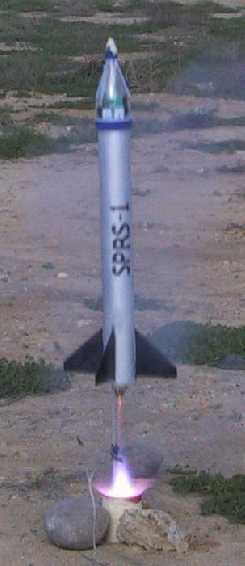
Click here for a movie of the rocket in boost, and the steerable parachute in action! Most of the work for this rocket went into the payload, which was rebuilt after it crashed on it's second flight. The rocket itself is constructed in much the same way as Oh Baby, starting with a 3 inch mailing tube, rolling my own (29 mm) motor tube, cutting my own fins, and basically building the whole thing from scratch. I decided to build this rocket to carry a radio controlled steerable parachute. After much searching on the web, I found a kite called the "Superchute" from Coastal Kites that looked like it would be light and small enough to deploy from a smallish rocket, and give directional flight. I wanted to use a true parafoil, but the ones I found were too heavy or large. 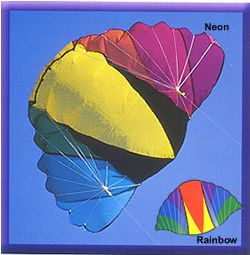
The payload consists of a RC/Radio and Servo driving a green plastic container cap to which the shroud lines are connected. In the picture below you can also see the nosecone made from a plastic drink bottle and the base holding the batteries. The payload looks cool as a gizmo in it's own right!. 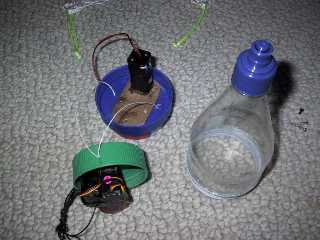
I wasn't sure how much I would need to pull on the kite to get it to perform (when you fly a dual-line kite, you often move the strings 6 or more inches), so in an effort to get as much play as possible, I modified the servo to have 180 degrees of rotation rather than the usual 90 degrees. I did this by opening the (HiTec) servo, and placing two 300 ohm resistors in series with the positioning potentiometer. I learned how to do it from a guy named Dave McDonald at his (now unreachable) webpage on modifying a Futaba S-148 servo, and arrived at the value to use for the HiTec servo by trial and error. It Works!! Update on SPRS!After SPRS crashed on it's second flight, the radio, servo, and battery pack were ok, so I rebuilt the nose cone. Pictured below is the rebuilt nose cone as it appeared just before it's first successful flight. 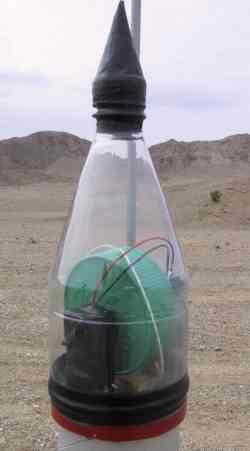
You can clearly see the shroud lines and the 3" Nestea Iced-Tea cap that I used (again!) for the drum. I also had to buy a bottle of Canada Dry tonic water to get a nice new clear nose cone cover. The cover is just attached to the base with electrical tape. And instead of wood bases, to conserve weight, I just epoxied the servo mount and battery holder directly to the (new) base, although the servo cluster IS attached to the base with a 1" screw and washer. The base was once again another plastic container top, about 3.5" in diameter. The news is that IT WORKS GREAT!! On the first flight of the rebuild (the 3rd flight for SPRS), I loaded it up with a F20-4T, and it reached apogee at 900 or so feet. The parachute deployed, and I was able to trim it so that it flew straight. Then I had lots of time, and I was able to relax and enjoy flying it. Once trimmed it required only minute movements to turn it gracefully. It flew so well that on a subsequent flight I caught a thermal and could have literally stayed up for an hour if I wanted. 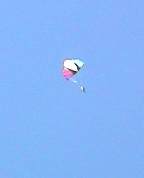
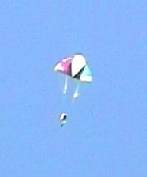
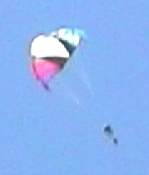
The parachute has no attitude control, but you can lose altitude by spiraling downwards and then correcting out of it. I think it would fly as is, with an 8 oz nosecone assembly, in upto 10-14 mph winds .. it needs more weight to fly faster, and until I get attitude control, I dont really want to go faster. The darned thing worked so well, I may just leave it like it is! Here is the flight log for the SPRS.
| ||||||||||||||||||||||||||||||||||||||||||||||||||||||||